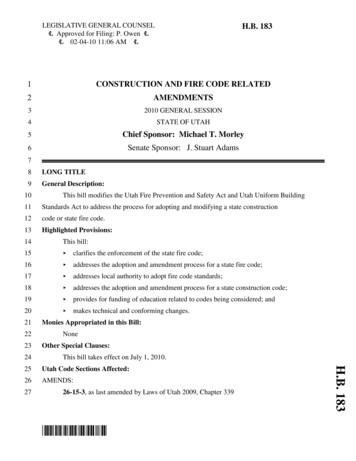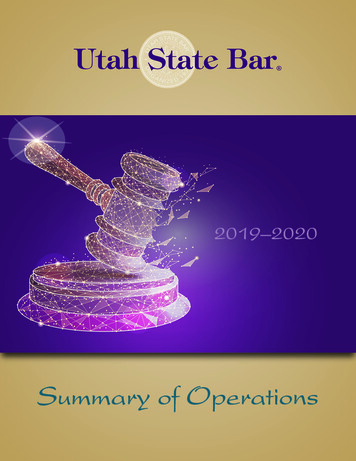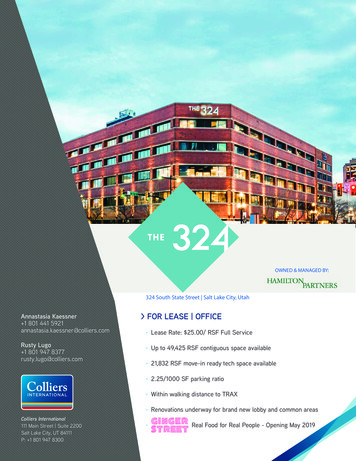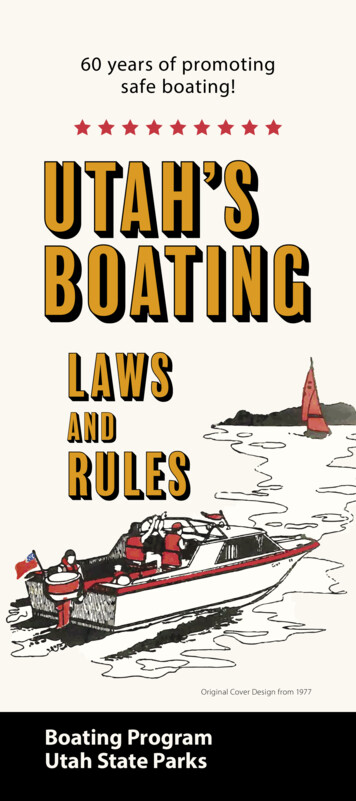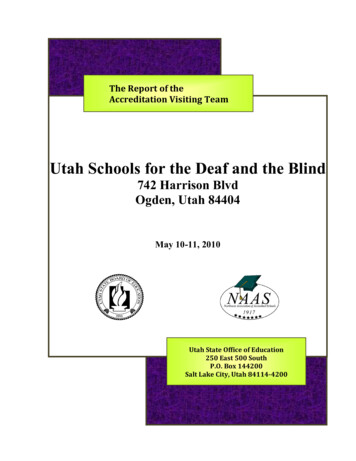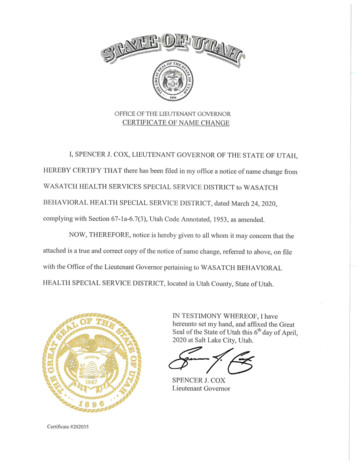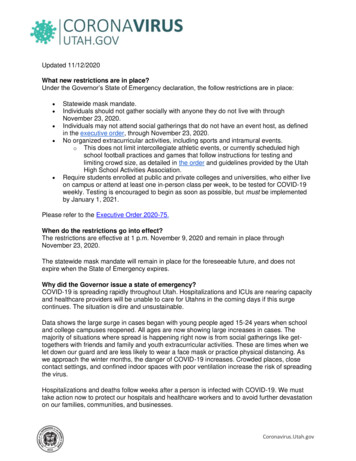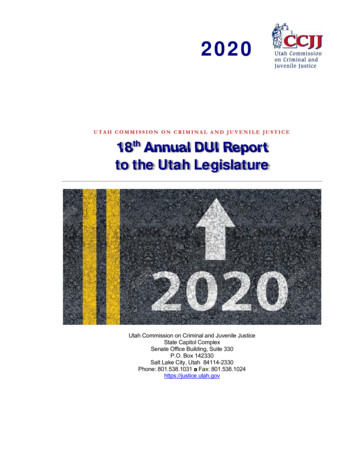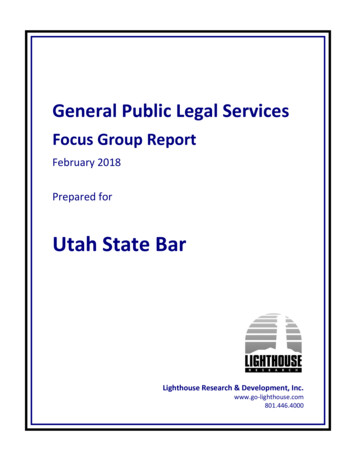
Transcription
General Public Legal ServicesFocus Group ReportFebruary 2018Prepared forUtah State BarLighthouse Research & Development, Inc.www.go-lighthouse.com801.446.4000
General Public Legal ServicesFocus Group ReportTABLE OF CONTENTSIntroduction1Conclusions and Opportunities5Detailed Results9Appendix A:Participant ScreenerA1Appendix B:Moderator’s Discussion GuideA7Appendix C:Participant HandoutA13
General Public Legal Services Focus Group Report Prepared for Utah State BarIntroductionLighthouse Research & Development, Inc. was contracted by the Utah State Bar to conduct two focusgroups with general public participants regarding their usage and perceptions of legal services.ObjectivesThe main objective of this research project was to discover participants’ perceptions and usage of legalservices. To accomplish the project objectives, participants were guided through a discussion thatencompassed the following topics and themes:Identify Usage of and Perceptions of Legal Services Gather general perceptions of lawyers Identify the perceived value of lawyers, according to participants Determine the point at which participants would consider using a lawyerDiscover the Barriers Preventing Individuals from Using Legal Services Identify the barriers preventing individuals from using the services provided by a lawyer Determine if participants agree or disagree with possible barriers for using legal servicesUnderstanding the Selection Process Identify the resources participants would rely on to find a lawyer Identify factors that are important to participants in choosing a lawyer Discover the process participants would go through to select the right lawyer for themDetermine Fee Preferences Determine why cost is such a barrier to using a lawyer’s services (i.e. up-front cost, hourly cost,and cost vs. benefit) Discover whether participants prefer a flat fee or an income-based fee when paying for legalservices Determine the reason for participants’ preferencesLighthouse Research & Development, Inc. February 20181
General Public Legal Services Focus Group Report Prepared for Utah State BarProject OverviewThe specific scope of work for this research project is described below: Recruitment of participants for each groupConfirmation emails and reminder telephone calls to each participantDevelopment of a moderator’s guide and participant handout, including specific discussion topics,questions, and ratingsFacilitation of the focus groupsDevelopment of a written report of resultsResearch MethodologyThe research methods used to complete the project are outlined in detail below.Screener Design and DevelopmentLighthouse Research, in consultation with Utah State Bar personnel, prepared the participant screener.The information collected during the screening process was used to verify participant eligibility and gatherdemographic information.Sampling ProceduresThe recruiting for the focus groups was conducted using general public sample.RecruitingExperienced executive recruiters from the Lighthouse Research facility in Riverton, Utah, conducted therecruiting. Interviewers were briefed thoroughly on the screener before proceeding with recruiting.Calling hours for this recruit were between 9:00 a.m. and 9:00 p.m. on weekdays. Participants receivedpersonal emails confirming their invitation to participate and indicating the date and time of thediscussion group. Careful attention was paid during the recruiting process to ensure only qualifiedindividuals were invited.Development of Moderator’s GuideLighthouse Research designed the moderator’s guide for the focus groups. The questionnaireencompassed the following topic areas: 2Identify Usage of and Perceptions of Legal ServicesDiscover the Barriers Preventing Individuals from Using Legal ServicesUnderstanding the Selection ProcessDetermine Fee PreferenceLighthouse Research & Development, Inc. February 2018
General Public Legal Services Focus Group Report Prepared for Utah State BarFocus Group FulfillmentA total of two focus groups were facilitated by Christie Leake, who guided participants through the topicareas outlined in the moderator’s guide. The focus groups were held February 6, 2018 at the offices ofLighthouse Research & Development, Inc. in Salt Lake City, Utah.Organization of the ReportData collected during the interviews was analyzed for reporting. The results were compiled and arepresented in this report, organized by the following areas: IntroductionConclusions and OpportunitiesDetailed ResultsAppendicesThe Conclusions and Opportunities section of this report includes a summary of the research findings fromthe focus groups.The Detailed Results portion of this report presents the complete findings of the research organized bytopic.The Appendices section provides frequency of results for the participant screener and focus grouphandout questions, verbatim open-ended responses provided by participants, and a copy of themoderator’s discussion guide.This report represents the deliverable for this portion of this contract and is presented respectfully to theproject sponsors.Lighthouse Research & Development, Inc. February 20183
General Public Legal Services Focus Group Report Prepared for Utah State Bar4Lighthouse Research & Development, Inc. February 2018
General Public Legal Services Focus Group Report Prepared for Utah State BarConclusions and OpportunitiesBased on the results of the research findings, Lighthouse Research respectfully makes the followingconclusions.Identify Usage of and Perceptions of Legal Services When identifying the words, thoughts and phrases that come to mind when they think of lawyers,participants mentioned both positive and negative associations. When discussing their positiveassociations of lawyers, participants described them as knowledgeable advocates who can handlesituations they themselves cannot. However, multiple participants reported having negativeperceptions of lawyers, as they perceive them to be aggressive, contentious, argumentative, anddishonest. When asked to rate their perceptions of lawyers, participants, on average, gave a mid-range ratingof 4.92 on the one-to-seven rating scale.Value of Lawyers When discussing the value provided by lawyers, multiple participants commented that lawyersact as powerful advocates for their clients, asserting their rights and offering protection; lawyersare dependable and willing to do whatever is necessary for their clients; and lawyers haveextensive knowledge that they themselves do not have. Participants who have used lawyers in the past overwhelmingly stated that despite the high costof services, it was worth it. Some participants said it would “take a lot” for them to engage a lawyer, while others said theywould only engage a lawyer as a last resort. Participants indicated that they would be more likelyto secure a lawyer’s services if they stood to gain or lose a great deal.Understanding the Selection Process When asked where they would go if they needed to find a lawyer, participants most frequentlysaid they would ask their friends and family members for recommendations or referrals.Participants also mentioned that they would ask lawyers they know for referrals. Someparticipants said they would look for lawyers through online search engines and Google reviews.Lighthouse Research & Development, Inc. February 20185
General Public Legal Services Focus Group Report Prepared for Utah State Bar Participants identified the following as the step-by-step process they would implement to selecta lawyer:o Step 1: Identify a needo Step 2: Identify the type of lawyer neededo Step 3: Ask for referrals, search for lawyers onlineo Step 4: Compile a list of lawyerso Step 5: Research recommended lawyerso Step 6: Schedule consultations with each lawyero Step 7: Interview lawyerso Step 8: Choose a lawyer When asked to identify the top factors they would consider before choosing a lawyer, participantsmost frequently said they would consider 1) knowledge and specialized experience, followed by2) cost.Discover the Barriers Preventing Individuals from Using Legal Services In general, participants identified three main barriers that prevent individuals from using alawyer’s services: 1) cost, 2) fear, and 3) not knowing how to engage a lawyer. Cost is the number one barrier preventing individuals from engaging legal counsel. When askedwhy cost is such a barrier to engaging a lawyer, participants generally mentioned one of twothings: 1) they perceive they can’t afford a lawyer and 2) they are intimidated by an hourly costand not knowing what a final cost will be. When asked to rate their agreement with various statements relating to potential barriers thatmay prevent individuals from seeking a lawyer, participants, on average, gave the highest ratingto “lawyers’ fees are too costly,” indicating that this is the statement they agree with most. Thestatement receiving the second highest average mean rating was “I can take care of most issuesmyself without the help of a lawyer.”Determine Fee Preference6 Participants, in general, demonstrated only a basic knowledge of what lawyers do. When asked if they are aware of how lawyers bill, multiple others said lawyers charge “by thehour” or “by the minute.” However, multiple participants said they are unsure of how lawyerscharge, which is a barrier to them engaging the services of a lawyer. When asked to indicate what they would be willing to pay for legal services if they needed to usea lawyer today, most participants said they don’t know what they would pay or that cost isdependent upon services provided. However, most participants said they would be willing to paybetween 100 and 200 an hour for legal services. When asked how valuable they would consider a one-hour meeting with a lawyer to be in varioussituations, participants gave the highest average mean rating to “lawsuits” and the second highestrating to “serious traffic citations or criminal charges,” indicating these are the situations whereparticipants consider a consult with a lawyer to be most valuable.Lighthouse Research & Development, Inc. February 2018
General Public Legal Services Focus Group Report Prepared for Utah State Bar When asked how much they would be willing to pay for a one-hour meeting in each of theaforementioned situations, participants, on average, said they would pay the most for personalinjury cases and the least for a dispute with a neighbor. Nearly three-fifths of participants (14) said they would prefer to pay an income-based sliding fee,while two-fifths (10) said they would prefer to pay a flat fee. Participants who said they wouldprefer a flat fee see this fee structure to be an advantage in that they know what their costs willbe from the very beginning of the process. Participants who would prefer an income-based slidingscale said they see this fee structure as more affordable for them.Conclusion At the conclusion of the groups, participants offered suggestions for making lawyers’ servicesmore attainable and appealing to the general public. In response, participants suggested offeringfree consultations, clinics, or seminars highlighting their areas of expertise. Participants alsosuggested making fees more affordable, or better communicating the affordability of fees. Someparticipants suggested capping fees or providing clear estimated fee structures.Lighthouse Research & Development, Inc. February 20187
General Public Legal Services Focus Group Report Prepared for Utah State Bar8Lighthouse Research & Development, Inc. February 2018
General Public Legal Services Focus Group Report Prepared for Utah State BarDetailed ResultsIdentify Usage of and Perceptions of Legal ServicesWord AssociationWhen identifying the words, thoughts and phrases that come to mind when they think of lawyers,participants mentioned both positive and negative associations. When discussing their positiveassociations of lawyers, participants described them as knowledgeable advocates who can handlesituations they, themselves, cannot. However, multiple participants reported having negative perceptionsof lawyers, as they perceive them to be aggressive, contentious, argumentative, and dishonest. Fordetails, please see Table 1.Table 1What words, thoughts, or phrases come to your mind when you think of “lawyers”?Positive AdvocatesEagerEducatedGood asseto “I think they’re a goodasset to have in your backpocket. If you have afriend who is an attorney,it’s handy.”HelpfulKnowledgeablePowerfulReady and willingRepresentativeSmartStudyingThere if you need them“They can say and do things Ican’t.”“They know the tricks.”“They know what you canand can’t do.”o “They’re there to helpyou to see things that youdon’t see from a legalaspect.”Negative AggressiveAssertiveCharge by the minuteContentiousArgumentativeConversations with them aredifficultDishonestExpensiveShark“They’re always right. Theyknow everything.”o “Some of my friends whoare lawyers are alwaysright. They make surethat you know it.”Lighthouse Research & Development, Inc. February 2018Neutral rs9
General Public Legal Services Focus Group Report Prepared for Utah State BarWhen asked to rate their perceptions of lawyers, participants, on average, gave a mid-range rating of 4.92on the one-to-seven rating scale.Some participants indicated they have had positive experiences with lawyers, thus their high perceptionratings. One participant said, “Most of the lawyers I know are very good people,” while another said, “Myown interactions with lawyers have both been very positive.” One other participant said, “I was up againsta big huge major, major firm. We went right to the top; this firm is an international firm, and they wouldhave eaten me alive. They went and found the ins and outs. I’m part of their family now. Those guys reallyknew their stuff.”Participants who gave low or mid-range ratings said they have had or have witnessed negative experienceswith lawyers. One participant said, “In my own personal experiences and the experience of friends,they’ve just been more of a waste of time than a help. They just want more money than anything.”Another said, “Knowing several people who have been divorced, I hear these horror stories. Ten, fifteen,twenty thousand dollars later, and they are in the exact same place they would have been when theystarted.”Value of LawyersWhen discussing the value provided by lawyers, multiple participants commented that lawyers act aspowerful advocates for their clients, asserting their rights and offering protection. One participant said,“They do give you a voice if you don’t really have one,” while another said, “The good ones can be a reallypowerful advocate for you.”Participants commented that lawyers are dependable and willing to do whatever is necessary to providefor their clients. One participant said, “They have a selfish perspective for your benefit,” while anothersaid, “I feel like whatever attorney is on your side, because you pay them so much, they are gung-ho foryou. Especially in a custody battle or something like that. They’re on your side, they’re there to protectyou.”Multiple participants commented that lawyers are valuable in that they have extensive knowledge thatthey themselves do not have. Participants indicated that lawyers “know the law,” “know the system,” and“understand risks.” One participant explained, “They have an extensive knowledge of the law that wedon’t.”Participants also mentioned that lawyers offer value in offering advice or counsel to their clients.Participants who had used lawyers previously overwhelmingly stated that even with the high fees theypaid, obtaining a lawyer was worth it. One participant said, “To me, they’re worth every penny.” Anothersaid, “It was worth it to me because it was a case I had tried to win on my own and didn’t. I was referredto by an attorney and it was successful.”10Lighthouse Research & Development, Inc. February 2018
General Public Legal Services Focus Group Report Prepared for Utah State BarEngaging a LawyerSome participants said it would “take a lot” for them to engage a lawyer. One participant said, “It wouldtake a lot because I know that it’s going to be more than I can afford.” Another said, “I think mine wouldbe probably quite a ways down the line before I get a lawyer because of the expense. The only time weever had a lawyer they billed by the minute and it was very expensive.”Multiple participants said they would engage a lawyer, only as a last resort. One participant said, “I wouldtry to do everything on my own at first. I feel like there are a lot of things you can do on your own. But ifI wasn’t able to go any further or if it was something that I felt like I needed an advocate or a lawyer, thenI would get one.” Another participant said, “I’m the kind of person that would try to solve problems onmy own. I think it’s better. If you can negotiate with someone else and come to an agreement without, itcan have a positive resolution.”Participants explained that if they stood to lose or gain a lot, they would engage the services of a lawyer.One participant said, “If I stood to lose more than I have or a significant amount of money, it would beworth it to me.” Another said, “Fear is a big motivator for most people. A fear of losing your house or yourkids [would cause me to engage a lawyer].” One other participant said, “It depends on the extent of theramifications or if the effects of it are going to make a significant change in my life.”Understanding the Selection ProcessUseful ResourcesWhen asked where they would go if they needed to find a lawyer, participants most frequently said theywould ask their friends and family members for recommendations or referrals. Participants alsomentioned that they would ask lawyers they know for referrals.In addition, participants said they would seek legal services by using Social media, Google or online searchengines, the Better Business Bureau, Thumbtack, and work resources.Lighthouse Research & Development, Inc. February 201811
General Public Legal Services Focus Group Report Prepared for Utah State BarStep-by-Step Process When Choosing a LawyerParticipants, in general, identified eight main steps they would take when choosing a lawyer. Table 2below outlines these steps and includes explanations as to why each step is included.Table 2What steps would you go through before choosing a lawyer?ProcessStep 1Identify a need Step 2“You have to have a reason to get a lawyer. That would be the first step, in my opinion.”Identify the type of lawyer neededAsk for referrals, search for lawyers online Step 3 “My neighbor is a real estate attorney, but I know I could call him if I needed a taxattorney or whatever. I would call him for a referral.”“If I knew someone who had been through that situation, I would call them and find outwho they went with.”“I would go to social media because I like to get a lot of opinions. I would post on socialmedia and ask if anyone knows a good lawyer.”“I look at Google reviews as well.”Step 4Compile a list of lawyersStep 5Research recommended lawyersStep 6Schedule consultations with each lawyerInterview lawyersStep 7 Step 812“They have to be engaged and interested in my case and what I need. I’m not justanother case on their desk.”“Their experience of what cases have been worked that are similar to what they have.”“Some indication that your business is something they want.”Choose a lawyerLighthouse Research & Development, Inc. February 2018
General Public Legal Services Focus Group Report Prepared for Utah State BarImportant Factors in Choosing a LawyerWhen asked to identify the top factors they would consider before choosing a lawyer, participants mostfrequently said they would consider 1) knowledge and specialized experience, followed by 2) cost.Participants also felt that being a leader in their field and recommendations from others would be highlyimportant in selecting a lawyer. For details, please see Table 3.Table 3What are the top factors you would consider before choosing a lawyer?MostSecondThirdOverallKnowledge, specialized experience56314Cost, Billing011011Leader in their field3328Referrals6208Respect for client, treatment, friendliness4105Way they present information, passion0134Reputation, credibility0404If they are moral3014Professionalism0303Listen to clients1102Adequate support system and resources0022If they're successful0011Where they graduated0011Number of years of experience0101If you trust them1001If they are aggressive0101Time management0011Good communication1001Lighthouse Research & Development, Inc. February 201813
General Public Legal Services Focus Group Report Prepared for Utah State BarWhen asked how they know if an attorney is the right one for them, participants mentioned the following: “When I interview them, I want to know their philosophy, their experience, I even want to knowwhat cases they’ve won that relate to my case.”“You need one with goals that are compatible with your own.”“I think I want to know their connection with the firm because there are a lot of resources andthey can bounce ideas off them.”“You have to know and feel that they’re going to go to bat for you. You just have to feel it. Youcan usually tell when talking to someone if they’re interested and if they’re going to put in theeffort you want.”Discover the Barriers Preventing Individuals from Using Legal ServicesTop BarriersIn general, participants identified three main barriers that prevent individuals from using a lawyer’sservices: 1) cost, 2) fear, and 3) not knowing how to engage a lawyer.Cost is the number one barrier preventing individuals from engaging legal counsel. One participant said,“I think a lot of it is cost, first and foremost. Is it worth the amount of time and money and effort to gothrough this?”Multiple participants said they choose not to engage legal counsel as a result of fear. Specifically,participants are fearful of not knowing how much money they will end up paying for legal services andare fearful of the risks involved in securing legal counsel. Participants are also fearful of escalating theirissues “to the next level.”A handful of participants said they aren’t quite sure how to engage a lawyer. Specifically, participantsquestioned how to know if they need a lawyer, how to know which lawyer to go, and how to start theprocess of finding a lawyer.A couple of participants mentioned that sometimes it is easier to handle a matter themselves, rather thansecuring the services of a lawyer.Cost BarrierWhen asked why cost is such a barrier to engaging a lawyer, participants generally mentioned one of twothings: 1) they perceive they can’t afford a lawyer and 2) they are intimidated by an hourly cost and notknowing what a final cost will be.Multiple participants said they can’t afford the services provided by an attorney. One participant said,“We don’t all have money,” while another said, “I don’t have a lot of money to throw around.” Oneparticipant said, “Most of them want a retainer, at least two to five thousand, before they’ll even talk toyou.” One more participant said, “I don’t know if I have a misconception, but my perception is that it’salways e
General Public Legal Services Focus Group Report Prepared for Utah State Bar Lighthouse Research & Development, Inc. February 2018 1 Introduction Lighthouse Research & Development, Inc. was contracted by the Utah State Bar to conduct two focus groups with general public participants regarding their usage and perceptions of legal services.


